ESG Library
Resource Recycling
Basic Approach
The DOWA Group is endeavoring to help create a sustainable society by curbing the consumption of natural resources and promoting the reuse of spent resources. The pursuit of a resource-recycling society has been accelerated globally and needs for recycling have increased further. Resource recycling on a global scale is also essential for creating a circular economy and achieving carbon neutrality, which means we can expect the value of recycled metals to increase in the future. Taking these factors into account, we aim to increase the ratio of metals derived from recycled raw materials that are used in production. By pursuing this goal and others like it, we hope to enhance our metal recycling efforts further as a means to create a recycling-oriented society.
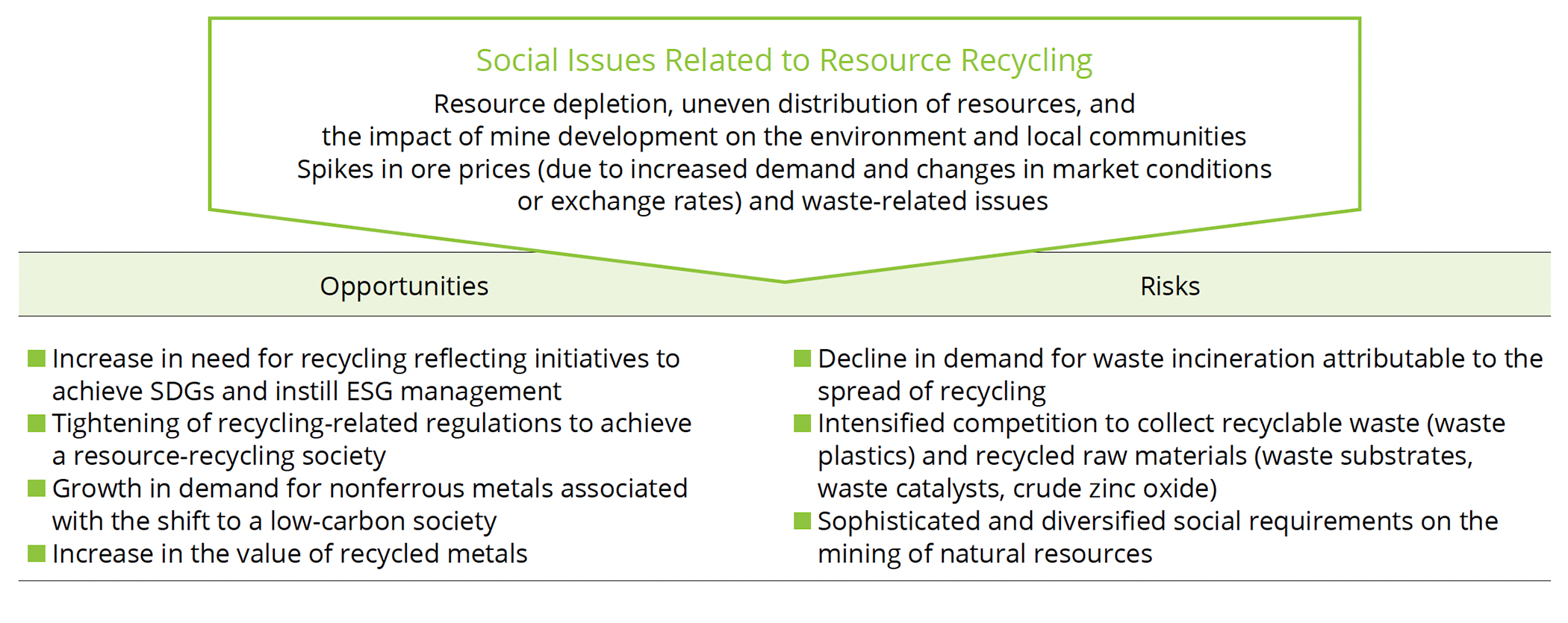
DOWA’s Business and the SDGs
 We believe that SDG 12, calling for “sustainable consumption and production patterns,” holds the greatest relevance to DOWA, which thrives on the utilization of metal resources, an area where we can make a massive contribution. As put forth in our Corporate Mission, we aim to achieve SDG 12 by putting our technologies and resources toward building a recycling-oriented society.
We believe that SDG 12, calling for “sustainable consumption and production patterns,” holds the greatest relevance to DOWA, which thrives on the utilization of metal resources, an area where we can make a massive contribution. As put forth in our Corporate Mission, we aim to achieve SDG 12 by putting our technologies and resources toward building a recycling-oriented society.
Achievements and Targets
| Key Measures | Indicators | Targets |
|---|---|---|
| Increase collection of recycled raw materials | Volume of recycled raw materials collected by Kosaka Smelting & Refining (FY2021 = 100) |
110 (FY2024) |
| Volume of spent catalysts from automobile exhaust purification collected (FY2021 = 100) |
140 (FY2024) |
|
| Volume of recycled for used Lithium-Ion Batteries (FY2021 = 100) |
400 (FY2024) |
|
| Increase ratio of metals derived from recycled raw materials | Ratio of metals derived from recycling that are used in production (based on sales in the Nonferrous Metals Business)* |
70% (FY2024) |
*”Recycled raw materials” includes secondary smelting raw materials other than recycled raw materials for Kosaka Smelting & Refining
Recycling-Oriented Business Model Centered on Metals
The DOWA Group has developed a unique recycling-oriented business model that combines its five core businesses and ranges from metal production to the manufacture of products with high added value. The Environmental Management & Recycling Business deals with waste detoxification and the separation and collection of metals from discarded or spent products or other sources for use as raw materials for smelting. The Nonferrous Metals Business is responsible for extracting useful metals from recycled raw materials and natural resources, namely metal ores. The Electronic Materials Business, the Metal Processing Business, and the Heat Treatment Business perform various types of processing, including purity improvement treatment, electroplating, and heat treatment, to produce functional materials that help generate added value and are then incorporated in final products, such as automobiles and electronic devices. When these products, whether they are aimed at manufacturers, consumers, or anyone in between, reach the end of their life cycles, and the metals contained within are once again recovered by the Environmental Management & Recycling Business, which begins another cycle of this resource-recycling network.
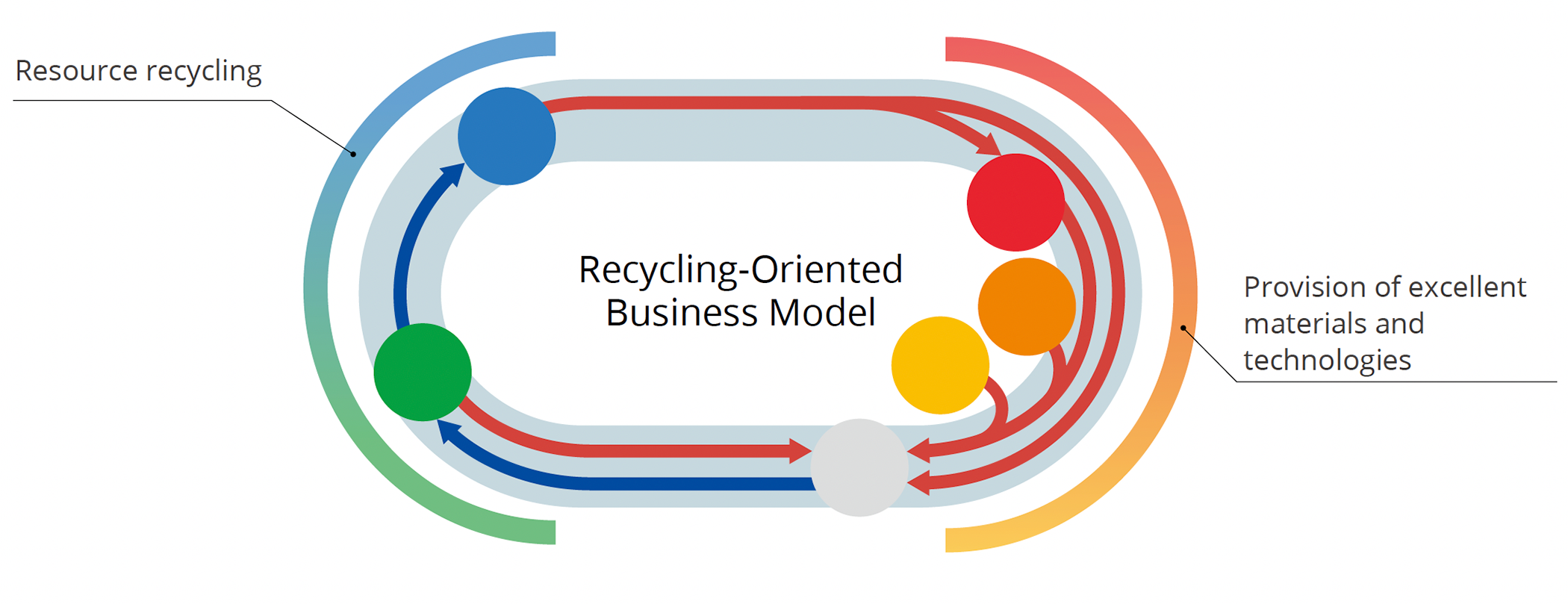
Enhancement of Metal Recycling
Centered on Kosaka Smelting & Refining Co., Ltd., a smelting and recycling facility, we are working to further strengthen our unique recycling-oriented business model, which combines our environmental business with the smelting of recycled materials. Our intention is to increase the amount of metals derived from recycling that are used in production through collaboration between the Environmental Management & Recycling Business and the Nonferrous Metals Business. To this end, we are moving forward with efforts that include expanding the collection of recycled raw materials, upgrading equipment at each plan, and increasing the types of metals we can recover.
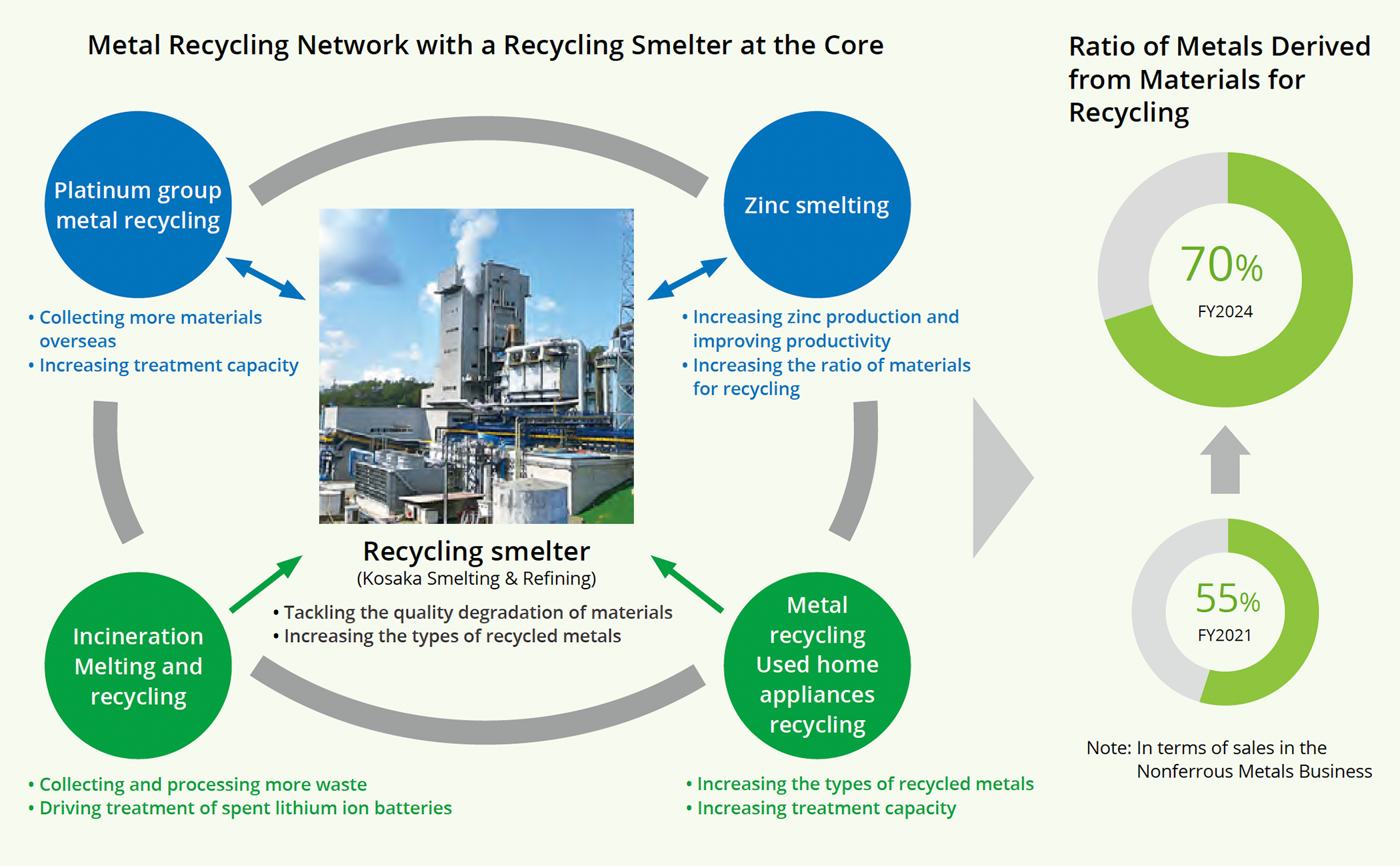
Integration of the Environmental Management & Recycling Business and the Nonferrous Metals Business
The integration of the Environmental Management & Recycling Business and the Nonferrous Metals Business is a crucial step toward more robust resource recycling. Therefore, we are planning to enhance the pretreatment function of the Environmental Management & Recycling Business, which will allow us to ramp up the collection and treatment of recycled raw materials. In the Nonferrous Metals Business, we will raise efficiency by upgrading equipment, which will allow us to recover a greater range of metals.
Three Main Loops of Resource Recycling
At the DOWA Group we are working on effective utilization of limited resources through the three loops of our own manufacturing process, the manufacturing processes of other companies, and the waste generated by society. At the same time, as a social responsibility in resource recycling, together with striving to minimize the environmental impact at every stage of recycling, such as appropriate water treatment, detoxifying waste and reliable landfill, we are aiming for sustainable resource recycling that considers environmental conservation and energy savings, such as using heat generated in the treatment process as steam or electric power.
- With in-house generation and usage, for waste generated in the” manufacturing business”, such as our smelting and metal processing, it is recycled in the “environmental business” and “nonferrous metals business”. Besides selling it as metallic material, we re-use it as raw material for our company.
- Accepting and recycling scrap metal generated from the processes of manufacturing plants at other companies. In case it is from client factories that supply our materials or par ts, such thin gs as reusing theaccepted waste as raw material leads to a reduction of new resource inputs.
- Recycling of used end products. Through electrical appliance recycling, automobile recycling and the recycling of small household appliances, used products widely recovered from society will be returned to society as metallic material again.
In addition, with regards to paper and aluminum, etc., that we cannot use, we strive to appropriately recycle through the recycling processes of other companies.
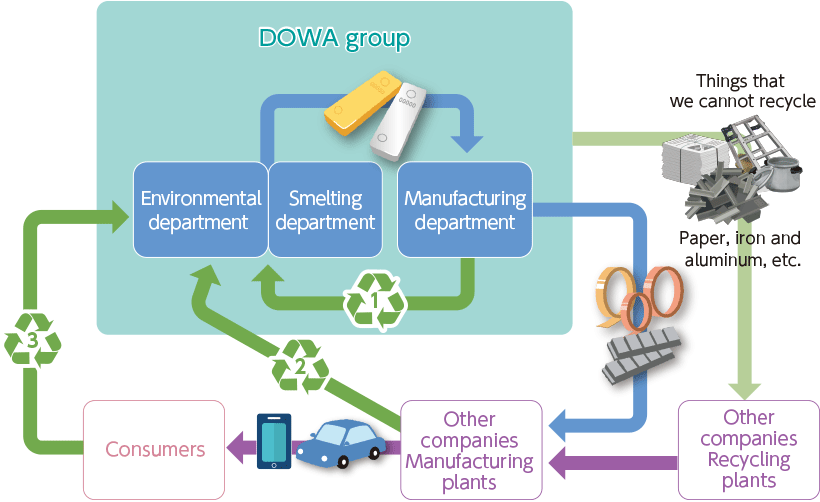
Efforts Aimed at the Sustainable Use of Resources
Recycling is one possible way to promote effective resource use. However, this requires technology to recover metals efficiently as well as the technology and infrastructure for safely processing harmful and non-harmful substances generated in the recycling process. Recycling also brings with it other technological and economic issues that must be addressed, such as the need to create an efficient collection system for recycling raw materials and a means for addressing the labor requirements and costs associated with processing this wide variety of raw materials. Bearing this in mind, the DOWA Group is working to promote the sustainable use of metal resources while taking on the various challenges present in resource recycling.
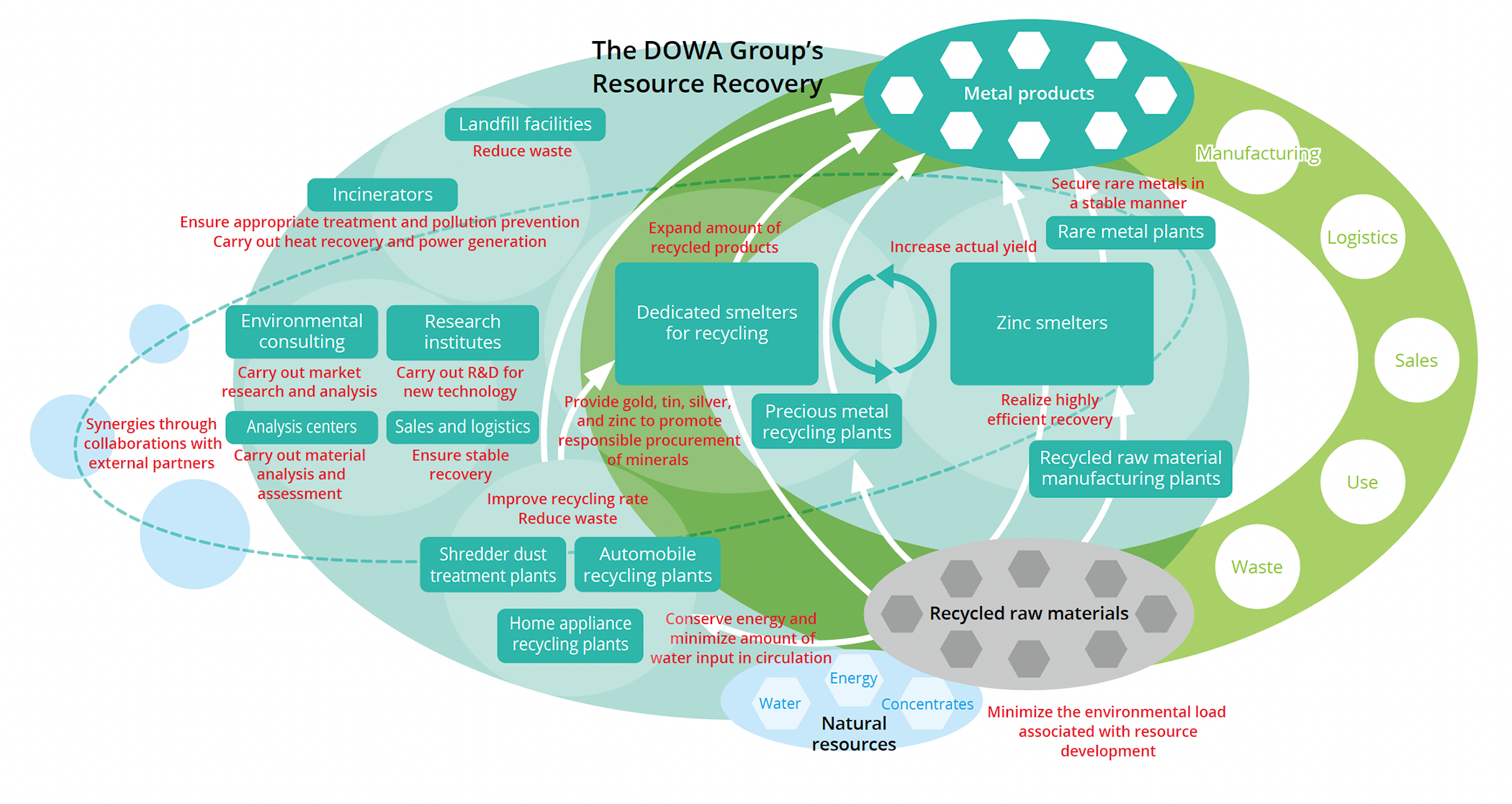
Recycling for Lithium-Ion Batteries
Lithium-ion batteries have broad applications, ranging from mobile phones to electric vehicles, with demand on the rise. However, when these batteries are discarded or dismantled, they pose the risk of electric shock or fire, and the value of the metals that can be recovered from spent batteries is subject to market prices. For these and other reasons, a treatment method that is not only stable but can be continued over the long term has yet to be developed. It is our hope that we will be able to develop a safe and efficient system to manage the large volume of batteries that will be produced in the future.
Since 2019, the Environmental Management & Recycling Business has operated a recycling line for spent lithium-ion batteries in Odate City, Akita Prefecture, with a monthly processing capacity of approximately 100 tons of treatable batteries. These batteries undergo detoxification by heat treatment, after which they are separated into iron, aluminum, cobalt–nickel mixtures, and other metals, turning them into recycled metal materials in an efficient manner. In 2021, we received a new license to utilize an existing furnace for recycling lithium-ion batteries, increasing the maximum capacity that we can accept sixfold. This expanded capacity means that even large lithium-ion batteries for automobiles can be processed safely without requiring them to be dismantled, thereby enabling even more efficient recycling.
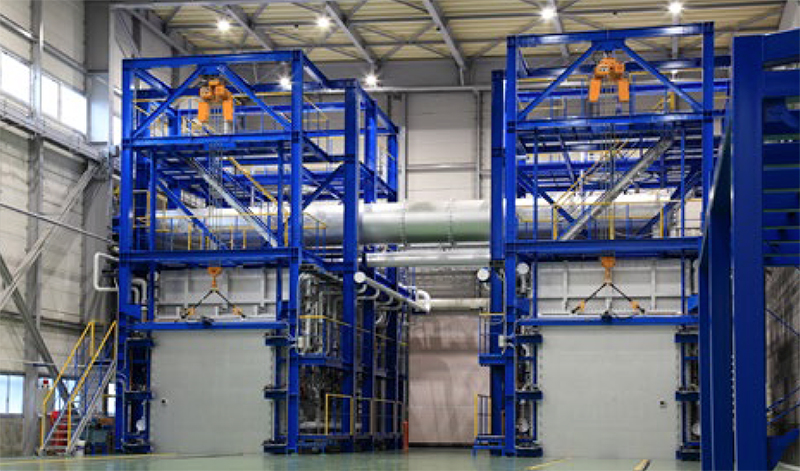
Optimization of the Resource-Recycling Value Chain
The DOWA Group operates a broad range of recycling businesses that deal with precious metals; home appliances, including discarded small household appliances; and automobiles. These businesses do not simply carry out recycling in isolation. Instead, we improve resource efficiency through a systematic treatment process that accounts for the specific characteristics of a facility in terms of technology as well as the geography and related circumstances of where that facility is located. The Group’s operating companies also collaborate with research laboratories and other departments involved in transport, analysis, and various other related areas of operation to utilize resources effectively. When necessary, the Group also works with outside sectors and partners in order to optimize the value chain. For example, we collaborate with steel manufacturers to recover metal from steel dust (secondary zinc raw material) and promote recycling of zinc using secondary raw materials.
One notable characteristic of DOWA’s business model is that it incorporates waste treatment in addition to recycling. Although we have devoted many years to improving our recycling technology and have worked to recycle increasing amounts of metals, there is some waste that cannot be recycled or reused with today’s technological capabilities. Since we possess facilities that are capable of properly treating and managing this waste, we are a vital link within the value chain that allows for greater resource efficiency, environmental conservation, and safety.
Resource Recycling on a Global Scale
To promote sustainable resource use on a global scale, it is also necessary to reduce environmental impact, maximize resource efficiency, and collaborate across national borders. Conscious of that, we utilize our unique set of resources, which includes recycling technology, infrastructure, knowledge, experience, and human resources, to develop metal recycling and waste treatment businesses not only in Japan but also in China, Singapore, Thailand, Indonesia, and Myanmar. In addition, in North America and Europe, which are our main sources of recycled raw materials, we collect these materials via our sales and sampling bases and recover rare metals at domestic smelters. Through these and other efforts, we have built a resource recycling system that is not only global but promotes environmental conservation.
Promoting the Appropriate Processing of Waste
For many years we have worked on improving recycling technology and are working on building a recycling-oriented society through the recycling of metals. However, in reality, there is waste that cannot be reused or recycled. Waste incineration facilities and final disposallandfill sites tend to be kept at a distance, but if they cannot be built, there is no place for the waste to go, and public health could not be guaranteed. We believe that our waste disposaltreatment business, which develops technically safe facilities, performs appropriate maintenance and sufficiently communicates with residents, plays an important role for society.
The landfill site is a facility that supports the foundation of resource recycling. The DOWA Group will continue to develop landfill sites that are necessary for society by enhancing waste disposal treatment technology and reliably ensuring their safety and security.
Initiatives in External Organisations
Circular Partners
The Dowa Group is participating in the Circular Partnership, which was launched to realize a circular economy based on the “Growth-Oriented Resource Autonomous Economy Strategy” of the Ministry of Economy, Trade and Industry. The Partnership will organically link organizations that are actively engaged in the circular economy, such as the national government, local governments, universities, and business and industry associations, and will study the measures that are necessary to realize the circular economy. Through these activities, we will collaborate with our partners and contribute to the realization of a circular society.